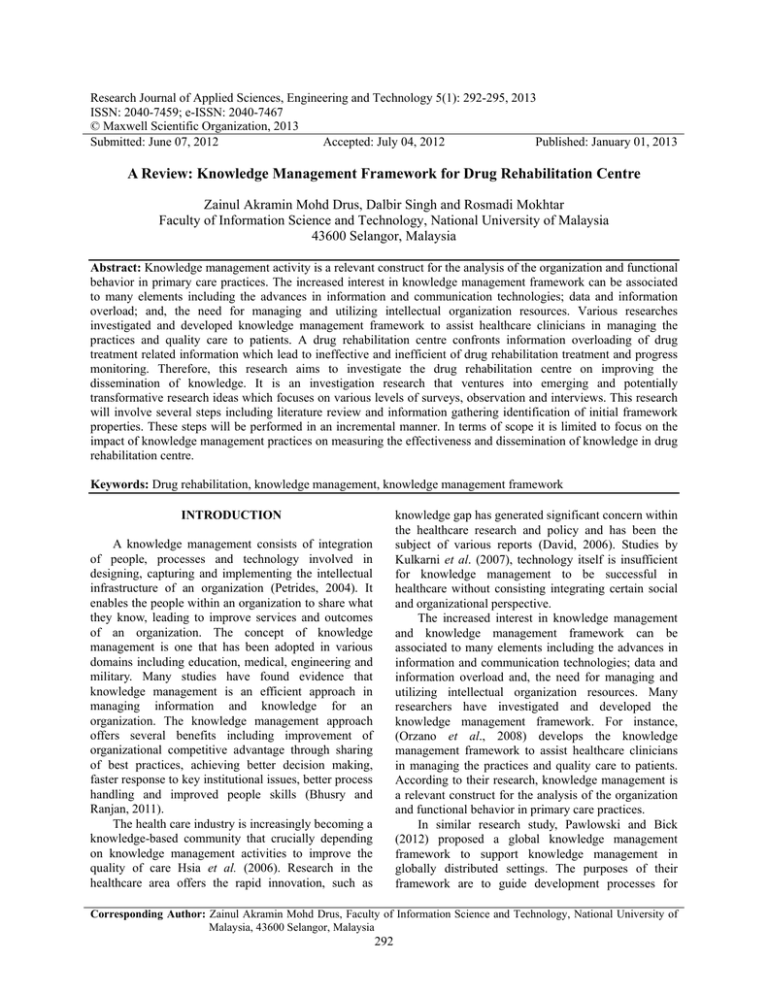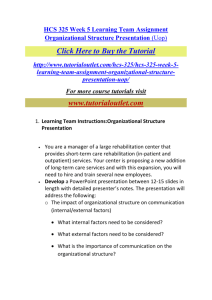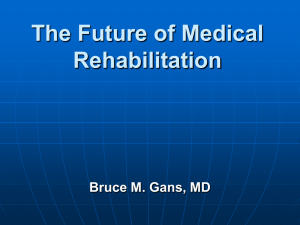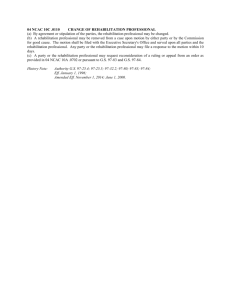Research Journal of Applied Sciences, Engineering and Technology 5(1): 292-295,... ISSN: 2040-7459; e-ISSN: 2040-7467
advertisement

Research Journal of Applied Sciences, Engineering and Technology 5(1): 292-295, 2013 ISSN: 2040-7459; e-ISSN: 2040-7467 © Maxwell Scientific Organization, 2013 Submitted: June 07, 2012 Accepted: July 04, 2012 Published: January 01, 2013 A Review: Knowledge Management Framework for Drug Rehabilitation Centre Zainul Akramin Mohd Drus, Dalbir Singh and Rosmadi Mokhtar Faculty of Information Science and Technology, National University of Malaysia 43600 Selangor, Malaysia Abstract: Knowledge management activity is a relevant construct for the analysis of the organization and functional behavior in primary care practices. The increased interest in knowledge management framework can be associated to many elements including the advances in information and communication technologies; data and information overload; and, the need for managing and utilizing intellectual organization resources. Various researches investigated and developed knowledge management framework to assist healthcare clinicians in managing the practices and quality care to patients. A drug rehabilitation centre confronts information overloading of drug treatment related information which lead to ineffective and inefficient of drug rehabilitation treatment and progress monitoring. Therefore, this research aims to investigate the drug rehabilitation centre on improving the dissemination of knowledge. It is an investigation research that ventures into emerging and potentially transformative research ideas which focuses on various levels of surveys, observation and interviews. This research will involve several steps including literature review and information gathering identification of initial framework properties. These steps will be performed in an incremental manner. In terms of scope it is limited to focus on the impact of knowledge management practices on measuring the effectiveness and dissemination of knowledge in drug rehabilitation centre. Keywords: Drug rehabilitation, knowledge management, knowledge management framework knowledge gap has generated significant concern within the healthcare research and policy and has been the subject of various reports (David, 2006). Studies by Kulkarni et al. (2007), technology itself is insufficient for knowledge management to be successful in healthcare without consisting integrating certain social and organizational perspective. The increased interest in knowledge management and knowledge management framework can be associated to many elements including the advances in information and communication technologies; data and information overload and, the need for managing and utilizing intellectual organization resources. Many researchers have investigated and developed the knowledge management framework. For instance, (Orzano et al., 2008) develops the knowledge management framework to assist healthcare clinicians in managing the practices and quality care to patients. According to their research, knowledge management is a relevant construct for the analysis of the organization and functional behavior in primary care practices. In similar research study, Pawlowski and Bick (2012) proposed a global knowledge management framework to support knowledge management in globally distributed settings. The purposes of their framework are to guide development processes for INTRODUCTION A knowledge management consists of integration of people, processes and technology involved in designing, capturing and implementing the intellectual infrastructure of an organization (Petrides, 2004). It enables the people within an organization to share what they know, leading to improve services and outcomes of an organization. The concept of knowledge management is one that has been adopted in various domains including education, medical, engineering and military. Many studies have found evidence that knowledge management is an efficient approach in managing information and knowledge for an organization. The knowledge management approach offers several benefits including improvement of organizational competitive advantage through sharing of best practices, achieving better decision making, faster response to key institutional issues, better process handling and improved people skills (Bhusry and Ranjan, 2011). The health care industry is increasingly becoming a knowledge-based community that crucially depending on knowledge management activities to improve the quality of care Hsia et al. (2006). Research in the healthcare area offers the rapid innovation, such as Corresponding Author: Zainul Akramin Mohd Drus, Faculty of Information Science and Technology, National University of Malaysia, 43600 Selangor, Malaysia 292 Res. J. Appl. Sci. Eng. Technol., 5(1): 292-295, 2013 decision makers as well as implementers and as a reference for researchers to perform research comparison (Pawlowski and Bick, 2012). Inspired by the existing study on knowledge management framework, we have made an attempt to apply similar ideas to our research i.e., knowledge management framework for drug rehabilitation centre. This rehabilitation centre is responsible for the management of the rehabilitation treatment and progress monitoring for locals and foreigners drug users. From time to time, the rehabilitation centre receives a large amount of registration application from the drug users. Thus, the rehabilitation centre has to store and manage the drug user’s information effectively as to monitor the progress of the drug users. These will lead to several difficulties including information cannot be easily search, cannot be easily modified and the usage of massive amount of space required for storage. Further, the spreadsheet system is unable to store a large amount of information. Due to the problems stated above, we reviewed the communal and factors involved that will support the rehabilitation centre in the management of information and knowledge resources regarding to drugs users, rehabilitation treatments and monitoring methods. The aim of this research is to specify and design a knowledge management framework in an effective way for the rehabilitation centre. In this study, we present various review of literatures on knowledge management framework discussed in second section. The third section, we summarized the reviewed literatures and identify factors entails in proposing our knowledge management framework in the following section. The next section will be summarizing the benefits and implications of the identified factors. Finally we conclude this study. LITERATURE REVIEW Significant work has been accomplished in the area of knowledge management framework in various domains and many contributions have been made by the researchers in this field. A research done by Orzano et al. (2008), develop knowledge management framework to assist healthcare clinicians in managing the practices and quality care to patients. According to their previous research the quality of work relationship is prominent factors that influence performance differences, but another less developed organizational characteristic is related to the potential to access and use information as fundamental to building knowledge (Orzano et al., 2008). This problem stated influenced the author to propose a knowledge management framework to facilitate and improving quality in the management of health care. The study Pawlowski and Bick (2012) discussed about a framework to guide development processes for decision makers as well as implementers and as a reference for researchers to perform research comparison. A number of knowledge management projects fails due to influence factors are unclearly understood (Coakes et al., 2010). The influence factors refer to geographical dispersion, communication across time zone and cultural that became the issue of the research. The research by Richter and Pawlowski (2008) agreed that in particular the case for global settings in which the context plays a major role such as cultural (Holden, 2001; Pauleen, 2006), political, legal, or infrastructural aspects. Higher education institutions facing similar pressures as from the private sector as claimed by the researcher, private colleges are experiencing huge challenges due to the structural changes. Mary et al. (2005) done the research and presented the knowledge management multi-modeling framework to propose four organizational strategies for higher educationculture, leadership, technology and measurement and three academic knowledge management strategies: individual, institutional and network. The article explains the need for a blend of organizational and knowledge management strategies for a robust knowledge management system. On the other hand, exploring how a nonprofit organization can implement the concept of knowledge management and subsequently measure the intellectual capital, specifically in Asian private college. Delen and Al-Hawamdeh (2009) proposed a holistic framework for knowledge management due to the vast amount of digital information and communication technologies, data explosion and information overloaded. Besides that, the authors mentioned retiring workforce and the need organization needs in utilizing their intellectual capital to stay ahead of the competition. This highly integrated framework is composed of a number of interdependent modules designed to perform the activities of the knowledge management cycle including creating, extracting, storing and using/reusing knowledge. By measuring knowledge management approach that considered by Yuan and Yang (2009) in helping the industry to develop and expand the body of sustainability knowledge on infrastructure development and providing better communication and decision support through managing the knowledge within the sector. The authors proposed a framework that encapsulates the whole process for decision making of infrastructures that are compounded by the fact that very often there is no common understanding among stakeholders. The process consists of twofold. First, it is to review and assess the knowledge being used to promote infrastructure sustainability. Second, describes 293 Res. J. Appl. Sci. Eng. Technol., 5(1): 292-295, 2013 Table 1: Summarized reviewed literature Literatures Organization Orzano Pawlowski Mary, Yeh Delen Yuan Bordoloi People a specific knowledge management approach to facilitate sustainability knowledge creation, capture, sharing and application. Bordoloi and Islam (2005) develop and describe a framework to provide an explanation of the application and impact of knowledge management practices in healthcare. The focus of the framework is limited to the impact of knowledge management practices on measuring effectiveness and quality in clinical and patient care in the context of healthcare. The contingency conceptual framework proposed explores the factors of physician characteristics, ailment characteristics and organizational IT infrastructure and organization processes. The authors identified knowledge management practices and explores their linkages with technical and interpersonal care, as from another viewpoint that provides implications for administrators and practitioners in healthcare delivery on management contingency factors so that the knowledge management practices can be properly implemented. Critical reviewed summary: Our studies are motivated by the related research to explore the features, factors and characteristic from other researchers regarding knowledge management framework. Based on the outputs from Table 1, we are inspired to make an attempt to apply similar ideas to our research in proposing knowledge management framework for drug rehabilitation centre that facilitates the organization in capturing structuring and disseminating knowledge so that it is ready and available. The outputs will then be analyzed in Table 2 that will illustrate the main communal and exemplar factors in proposing the framework. Reviewed common factors: By observing the result of the analysis from Table 2, we identified the communal and exemplar factors in proposing our framework. The factors consist of organization (drug rehabilitation centre) that needs to better utilize their intellectual resources to stay in advance. General aim of knowledge management is to increase and improve the systematic management of knowledge and potential knowledge within the organization (Heisig, 2009).Thus, important role by people (staff and drug users) which previous Culture x x x Process Infrastructure Table 2: Drug rehabilitation centre's factors Factors Drug rehabilitation centre Organization Increase and improve knowledge dissemination within organization People Knowledge sharing amongst drug users and management staff Culture Various races and origin Process Organization processes Infrastructure ICT infrastructures experience and treatment could be extended to apprentice will have an effect on their usage of knowledge management practices (Liebowitz, 2007). The course of identifying, growing and effectively applying the organization’s knowledge achieving the organization’s goal while creating a culture that permits further knowledge creation (Duffy, 1999; Sveiby, 2001). Implementation of knowledge management in healthcare organizations is dependent on leadership, culture and infrastructure (Sensky, 2002; Bali et al., 2005). Therefore, in drug rehabilitation centre, culture is a prior necessity since drug users are multinational and various language as well as ethnicity. Knowledge management process could be effectively enhanced through practice by allowing sharing and collaborating and risk taking within organization (Horak, 2001). Whereby, the drug rehabilitation centre’s process would benefit knowledge through sharing within the organization, for instance applying treatment methods. Finally, an infrastructure that proficiently deploys resources such as technology, office systems, or individual resource functions can be significant for online learning, communication and sharing of knowledge (Sandars, 2004). Hence, the benefit from elements associated to infrastructure would increase the systematic management resources of the knowledge management in drug rehabilitation centre. CONCLUSION In this study, inspiration and motivation from previous literature assist us to identify the factors, features and characteristics in proposing a knowledge management framework. The framework is a solution for the drug rehabilitation centre in improving effective way to dissemination of knowledge throughout the organization. 294 Res. J. Appl. Sci. Eng. Technol., 5(1): 292-295, 2013 From the result of the summarized factors, we conclude that the importance of factors involved in proposing the knowledge management framework are significant. Finally, this study will be carried on in future to produce a conceptual framework and validate it in the drug rehabilitation centre. REFERENCES Bali, R.K., A. Dwivedi and R. Naguib, 2005. Issues in Clinical Knowledge Management: Revisiting Healthcare Management. In: Bali, R.K. (Ed.), Clinical Knowledge Management. Idea Group Publishing, pp: 1-10. Bhusry, M. and J. Ranjan, 2011. Implementing knowledge management in higher educational institutions in India: A conceptual framework. Int. J. Comput. Appl., 29(1): 34-46, DOI: 10.5120/3527-4805. Bordoloi, P. and N. Islam, 2005. Knowledge management practices and healthcare delivery: A contingency framework. A Contingency Framework. Electronic J. Knowl. Manage., 10(2): 110-120. Coakes, E., A.D. Amar and M.L. Granados, 2010. Knowledge management, strategy and technology: A global snapshot. J. Enterp. Inform. Manage., 23(3): 282-304, DOI: 10.1108/17410 3910 1103 6076. David, S.C., 2006. A Review of UK Health Research Funding. The Stationery Office, Norwich, pp: 119, ISBN: 0118404881. Delen, D. and S. Al-Hawamdeh, 2009. A holistic framework for knowledge discovery and management. Commun. ACM, 52(6): 141, DOI: 10.1145/1516046.1516082. Duffy, N., 1999. Benchmarking Knowledge Strategy. In: Duffy, A. Jooste and L. Whittaker (Eds.), Leveraging Knowledge for Business Performance: Knowledge in Action. WITS Business School, Johannesburg. Heisig, P., 2009. Harmonisation of knowledge management-comparing 160 KM frameworks around the globe. J. Knowl. Manage., 13(4): 4-31, DOI: 10.1108/13673270910971798. Holden, N., 2001. Knowledge management: Raising the spectre of the cross-cultural dimension. Knowl. Proc. Manage., 8(3): 155-163. Horak, B.J., 2001. Dealing with human factors and managing change in knowledge management. Top Health Inf. Manage., 21(3): 8-17. Hsia, T.L., L.M. Lin, J.H. Wu and H.T. Tsai, 2006. A framework for designing nursing knowledge management systems. Interdisciplinary J. Inf. Knowl. Manage., 1: 13-22. Kulkarni, U.R., S. Ravindran and R. Freeze, 2007. A knowledge management success model: Theoretical development and empirical validation. J. Manage. Inform. Syst., 23(3): 309-347, DOI: 10.2753/MIS0742-1222230311. Liebowitz, J., 2007. The hidden power of social networks and knowledge sharing in healthcare. Healthcare Knowl. Manage., DOI: 10.1007/978-0387-49009-0_8. Mary, Y., C. Yeh and Y. Ta, 2005. The implementation of knowledge management system. Taiwan’s High. Educ., 2(9): 35-42. Orzano, A.J., C.R. Mcinerney, D. Scharf, A.F. Tallia and B.F. Crabtree, 2008. A knowledge management model: Implications for enhancing quality in health care. J. Am. Soc. Inform. Sci. Technol., 59(3): 489-505. Pauleen, D., 2006. Cross-Cultural Perspectives on Knowledge Management. Libraries Unlimited, Westport, pp: 259, ISBN: 1591583314. Pawlowski, J. and M. Bick, 2012. The global knowledge management framework: Towards a theory for knowledge management in globally distributed settings. Electr. J. Knowl. Manage., 10(1): 92-108. Petrides, L.A., 2004. knowledge management, information systems and organizations. EDUCAUSE Cent. Appl. Res., 2004(20): 1-12. Richter, T. and J.M. Pawlowski, 2008. Adaptation of Elearning environments determining national differences through context metadata. Inter. J. Cult. Stud., Vol. 17. Sandars, J., 2004. Knowledge management: Something old, something new! Work based learn. Primary Care, 2(1): 9-17. Sensky, T., 2002. Knowledge management. Adv. Psychiat. Treatment, 8: 387-395. Sveiby, K.E., 2001. What is Knowledge Management? Retrieved from: http:/ /books. google. com.pk/ books?id=itMESQAACAAJ&dq=What+is+Knowl edge+Management,+2001&hl=en&sa=X&ei=FuY HUKfMKsbtrQeJkunxAg&ved=0CCsQ6AEwAA. Yuan, M. and J. Yang, 2009. A knowledge management framework to promote infrastructure project sustainability. Proceedings of the 15th International Symposium on Construction Management and Real Estate, 29th-31st October 2009, Nanjing, China, 16: 2480-2486. Retrieved from: http://eprints.qut.edu.au/28550/1/28550.pdf. 295


